May Christ bring us all together to everlasting life. Rule of Benedict
Working on a writing assignment for a class taken during a sabbatical several years ago, Sister Phyllis McMurray (1943-2013) hit a brick wall. She was to reflect on the story of Peter walking on water. While she felt competent discussing the theological implications of the story, she felt at a loss to offer a practical, everyday insight.
Then her mother called.
Vicky McMurray – a good-humored and loving woman – had been confined to a wheelchair for many years with multiple sclerosis. If anyone had a right to be angry or bitter, it was surely she. Yet Vicky's cheerful demeanor, positive outlook and hopeful attitude graced all who came near her.
Vicky asked her daughter what she was working on. Sr. Phyllis explained her difficulty with the assignment. Her mom chuckled and replied, "I walk on water every day."
"That really hit me hard," Sr. Phyllis says today. "My mom never took a theology course. And she couldn't walk at all. But her faith and wisdom were extraordinary."
Indeed. As Peter 2,000 years before, Vicky's faith allowed her to do things she could never otherwise have achieved, including claiming and sharing God's joy, despite being wheelchair-bound.
Spiritual teachers offer guidance in every life, whether formally or informally, in expected or quite unexpected moments. Thinking back on our lives, we might identify such moments. We might have had a chance encounter in a grocery checkout lane that opened our eyes for the first time. We might have heard words from someone, seen something or read a passage that changed our hearts. We might have had a life-changing dream.
For this article, several Sisters looked back on their own lives to identify moments or people who have been key to their own spiritual growth. Here are their stories.
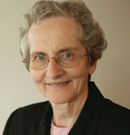 Sister Marianne Burkhard, OSB
Sister Marianne Burkhard, OSB
Marianne had been a seeker all her life – which included growing up in Switzerland and studying in France - when she came to the U.S. and accepted a faculty position at the University of Illinois in 1968. Here, she continued her quest to discover what her spirituality – and new Catholicism – could really mean for her.
The quest took the young professor to Bloomington, Ill., where she met Benedictine Sister Audrey Cleary, OSB.
"Sr. Audrey had a wonderful way of listening," Sr. Marianne says. "She became my spiritual director."
As such, Sr. Audrey was able to both hear some of the questions Marianne was struggling with, and reflect them back to her.
"I re-discovered a fascination with monastic life I'd had since I was in my teens," Sr. Marianne says. "I began to wonder if I was being called to religious life. Sr. Audrey suggested I just live with the question, that I shouldn't expect an answer very soon. She said, 'Making a list of pros and cons is fine, but living with it in your gut is critical. How's it feel if you do it? How's it feel if you don't?'
"This is a really important spiritual teaching," Sr. Marianne says. "We are not comfortable living gradually into answers. We want answers last night or tonight. But the final clarification doesn't occur on the intellectual level."
Three years later, Marianne became Sister Marianne. She still looks to Sr. Audrey's wisdom for guidance today. "People don't look for wisdom as much as they look for intelligence," she says. "But if you don't integrate intelligence with feeling and intuition, you don't have wisdom."
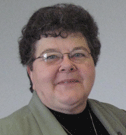 Sister Mary Core, OSB
Sister Mary Core, OSB
Sr. Mary lugged her suitcase toward the car to join the others who were waiting for her. They were on their way to summer school to earn degrees, some in theology, some in education. As Sr. Mary arrived at the car, another Sister caught up with her.
"She said, 'Sister Loyola isn't doing well,'" Sr. Mary remembers. "Sister Loyola was very ill. She had been a great friend and teacher. I'm sure she prayed me into the community. I turned to go back in to see her, but the others were impatient to get on the road. They convinced me that she'd pull through and that I'd see her at the end of the summer."
Sister Loyola died later that day, and due to slow communications, Sr. Mary didn't find out about it until after the funeral had taken place.
"It broke my heart," Sr. Mary says. "It was all I could think of when I started my retreat at the end of the summer. I told my retreat director that I was having a hard time. That I was struggling with not being able to say goodbye to Sr. Loyola. He suggested that I write a letter to her. I wrote four pages to her. I told her what impact she'd made on me, with her simple but wise approach to life.
"I told my director I'd written it, and he said 'Why don't you go to the cemetery and read it to her?' So I hopped on my bike and pedaled out to her grave. As I read it to her, I cried and cried and cried. It was one of the great peace-making moments of my life. I felt her comfort me, which was totally the reverse of what I had wanted to do for her before she died. I had wanted to comfort her.
"It was such a healing moment. The lessons of that summer were pure grace. Pure grace."
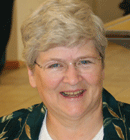 Sister Marlene Miller, OSB
Sister Marlene Miller, OSB
As many people, Sr. Marlene points first to her parents when asked to consider her most important spiritual teachers.
"My parents lived their faith," she says. "They didn't preach it. If we had to miss Mass because of the weather – we lived 30 miles away from our church – we would have an hour of quiet at home.
"They always showed great respect for everything. People, animals, things. My mom would drive people to the doctor when they were sick. Not everyone had a car. She would drive them to get groceries.
"Both Mom and Dad loaned money to people who were down and out. If they paid it back, fine. If not, fine.
"They never believed in getting even, in vengeance. Anger and guilt were not tools. They lived the Gospel. And taught me and my siblings by example."
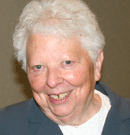 Sister Marilyn Ring, OSB
Sister Marilyn Ring, OSB
Giving truth to the Buddhist maxim that "when a student is ready, the teacher will appear," Sr. Marilyn traced a path of spiritual growth guided by several teachers. The path began at Notre Dame one summer in a class taught by Rev. Josef Goldbrunner.
"Father Goldbrunner had lived through World War II in Germany,"Sr. Marilyn begins. "He had been overwhelmed by the lack of Germans standing up against Hitler. His question - 'How did Christianity fail Germany?' – led to what I felt as the Heart and Action Movement. He got me out of my head. Out of my self. I began to see the needs of the people. He was incredibly influential in my early days of learning what it meant to give my life to God."
Giving her life to God took on new meaning as Sr. Marilyn began work as a campus minister at the University of Illinois. There, she met priests who had barely made it out of Latin America with their lives, but were still passionate in their advocacy for social justice among the people.
"These extraordinary people helped further develop my sense of what spirituality means," Sr. Marilyn says. "They helped me become aware of injustice. I began reaching out to those who were suffering. Social justice was the message of Jesus and it was very much alive. I – and many others – began wanting to really live the Gospel, not just talk about it."
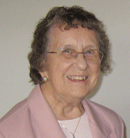 Sister Rita Cain, OSB
Sister Rita Cain, OSB
Sr. Rita doesn't hesitate when asked to name important spiritual teachers in her life.
"My parents, both, but particularly my mother," she says. "She raised 12 kids. We said the rosary every night during World War II, kneeling around the table in the kitchen. Immediately after dinner. We cleared the table, said the rosary and then washed the dishes.
"I had two brothers, two sisters and two brothers-in-law in the service. Sometimes we'd go for weeks or months without hearing from one of them. My parents must have been petrified. But they never built fear in us.
"Prayer was a powerful response. I learned that prayer was more important than dishes or dates or the radio. It was our direct connection with God."
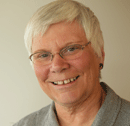 Sister Bobbi Bussan, OSB
Sister Bobbi Bussan, OSB
Sometimes the most profound spiritual insights come from undesirable experiences; say, the loss of a loved one or a frightening medical diagnosis. That was the case for Sr. Bobbi six years ago as she struggled with the side effects of chemotherapy during cancer treatment. Her fatigue was so pronounced that she often found it hard to focus on prayer.
Sr. Bobbi told her spiritual director, Sr. Maria Tasto (Immaculate Conception Monastery, Ferdinand, Ind.).
"Sr. Maria said, 'Isn't it nice that in times like this your prayers can carry you?' She told me that because I had been faithful in prayer, those prayers would help me through my difficult time.
"Over the years, I've continued to think about it. Our accumulated life of prayer is important. Our lifetime of faithfulness can carry us when the daily practice is hard. When we're out of balance or stressed for whatever reason. I really believe that's what a life of prayer gives us. The strength to get through the tough times."
